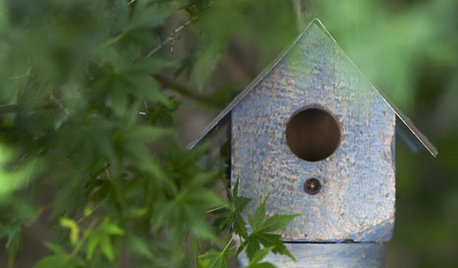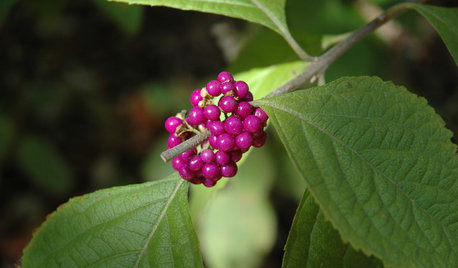Bad winter for Wildlife
kyme
19 years ago
Related Stories

GARDENING GUIDES6 Plants That Beat Butterfly Bush for the Wildlife Draw
It's invasive, a nonnative and a poor insect magnet. Check out these better alternatives to butterfly bush in the garden
Full Story
GARDENING FOR BUTTERFLIESGarden for Wildlife to Reap Rich Rewards
When you plant with animals and insects in mind, you make gardening easier, the planet healthier and yourself more present
Full Story
GARDENING AND LANDSCAPINGBe a Citizen Scientist to Help Wildlife, Learn and Have Fun Too
Track butterflies, study birds, capture stars ... when you aid monitoring efforts, you’re lending Mother Nature a hand
Full Story
GARDENING GUIDESGreat Design Plant: Cornus Florida Benefits Wildlife
Flowering dogwood provides fiery red foliage in fall and beautiful springtime blooms
Full Story
GARDENING GUIDESGreat Design Plant: Nourish Wildlife With American Beautyberry
The bright purple berries of Callicarpa americana feed winged beauties and make the Southeast U.S. native a fall garden standout
Full Story
GARDENING GUIDESGreat Design Plant: Feed Wildlife With Flowering Currant
Blossoms and berries make this plant irresistible to birds, bees and other critters — and a treat for the eyes too
Full Story
FLOWERS AND PLANTSHummingbird Sage Lures Wildlife With Its Sweet, Fruity Fragrance
This native California ground cover thrives with little water on grassy slopes, under trees or in patio containers
Full Story
LANDSCAPE DESIGN4 Tips for Creating a Small Garden That Welcomes Wildlife
Win over birds, bees, butterflies and neighbors with these design strategies
Full Story
EARTH DAYCreate a Container Wildlife Habitat for Hummingbirds and Butterflies
Don’t let limited space prevent you from welcoming wildlife into your garden
Full Story
GARDENING GUIDESGreat Design Plant: Silphium Perfoliatum Pleases Wildlife
Cup plant provides structure, cover, food and water to help attract and sustain wildlife in the eastern North American garden
Full Story





smartguy
thusie
Related Professionals
Arlington Landscape Architects & Landscape Designers · Belmont Landscape Architects & Landscape Designers · Surprise Landscape Contractors · Tempe Landscape Contractors · Belmont Landscape Contractors · Camp Verde Landscape Contractors · Fairfield Landscape Contractors · Mount Sinai Landscape Contractors · Seminole Landscape Contractors · Kingsburg Landscape Contractors · Laguna Hills Fence Contractors · Lake Jackson Fence Contractors · Peoria Fence Contractors · Woodland Fence Contractors · Nipomo Fence Contractorsohiogdnr
Magret
Magret
bakemom_gw
bolecke
gluecille
kymeOriginal Author
bolecke